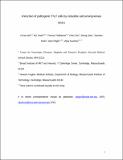| dc.contributor.author | Wu, Chuan | |
| dc.contributor.author | Yosef, Nir | |
| dc.contributor.author | Thalhamer, Theresa | |
| dc.contributor.author | Zhu, Chen | |
| dc.contributor.author | Xiao, Sheng | |
| dc.contributor.author | Kishi, Yasuhiro | |
| dc.contributor.author | Regev, Aviv | |
| dc.contributor.author | Kuchroo, Vijay K. | |
| dc.date.accessioned | 2013-09-20T14:02:02Z | |
| dc.date.available | 2013-09-20T14:02:02Z | |
| dc.date.issued | 2013-03 | |
| dc.date.submitted | 2012-05 | |
| dc.identifier.issn | 0028-0836 | |
| dc.identifier.issn | 1476-4687 | |
| dc.identifier.uri | http://hdl.handle.net/1721.1/80822 | |
| dc.description.abstract | T[subscript H]17 cells (interleukin-17 (IL-17)-producing helper T cells) are highly proinflammatory cells that are critical for clearing extracellular pathogens and for inducing multiple autoimmune diseases. IL-23 has a critical role in stabilizing and reinforcing the T[subscript H]17 phenotype by increasing expression of IL-23 receptor (IL-23R) and endowing T[subscript H]17 cells with pathogenic effector functions. However, the precise molecular mechanism by which IL-23 sustains the T[subscript H]17 response and induces pathogenic effector functions has not been elucidated. Here we used transcriptional profiling of developing T[subscript H]17 cells to construct a model of their signalling network and nominate major nodes that regulate T[subscript H]17 development. We identified serum glucocorticoid kinase 1 (SGK1), a serine/threonine kinase, as an essential node downstream of IL-23 signalling. SGK1 is critical for regulating IL-23R expression and stabilizing the T[subscript H]17 cell phenotype by deactivation of mouse Foxo1, a direct repressor of IL-23R expression. SGK1 has been shown to govern Na[superscript +] transport and salt (NaCl) homeostasis in other cells. We show here that a modest increase in salt concentration induces SGK1 expression, promotes IL-23R expression and enhances T[subscript H]17 cell differentiation in vitro and in vivo, accelerating the development of autoimmunity. Loss of SGK1 abrogated Na[superscript +]-mediated T[subscript H]17 differentiation in an IL-23-dependent manner. These data demonstrate that SGK1 has a critical role in the induction of pathogenic T[subscript H]17 cells and provide a molecular insight into a mechanism by which an environmental factor such as a high salt diet triggers T[subscript H]17 development and promotes tissue inflammation. | en_US |
| dc.description.sponsorship | National Institutes of Health (U.S.) (1P01HG005062-01) | en_US |
| dc.description.sponsorship | National Institutes of Health (U.S.) (1P50HG006193-01) | en_US |
| dc.description.sponsorship | National Institutes of Health (U.S.) (DP1-OD003958-01) | en_US |
| dc.description.sponsorship | Howard Hughes Medical Institute | en_US |
| dc.description.sponsorship | Klarman Cell Observatory | en_US |
| dc.description.sponsorship | Guthy-Jackson Charitable Foundation | en_US |
| dc.language.iso | en_US | |
| dc.publisher | Nature Publishing Group | en_US |
| dc.relation.isversionof | http://dx.doi.org/10.1038/nature11984 | en_US |
| dc.rights | Article is made available in accordance with the publisher's policy and may be subject to US copyright law. Please refer to the publisher's site for terms of use. | en_US |
| dc.source | Regev via Courtney Crummett | en_US |
| dc.title | Induction of pathogenic TH17 cells by inducible salt-sensing kinase SGK1 | en_US |
| dc.title.alternative | Induction of pathogenic T[subscript H]17 cells by inducible salt-sensing kinase SGK1 | en_US |
| dc.type | Article | en_US |
| dc.identifier.citation | Wu, Chuan, Nir Yosef, Theresa Thalhamer, Chen Zhu, Sheng Xiao, Yasuhiro Kishi, Aviv Regev, and Vijay K. Kuchroo. “Induction of pathogenic TH17 cells by inducible salt-sensing kinase SGK1.” Nature 496, no. 7446 (March 6, 2013): 513-517. | en_US |
| dc.contributor.department | Massachusetts Institute of Technology. Department of Biology | en_US |
| dc.contributor.approver | Regev, Aviv | en_US |
| dc.contributor.mitauthor | Regev, Aviv | en_US |
| dc.relation.journal | Nature | en_US |
| dc.eprint.version | Author's final manuscript | en_US |
| dc.type.uri | http://purl.org/eprint/type/JournalArticle | en_US |
| eprint.status | http://purl.org/eprint/status/PeerReviewed | en_US |
| dspace.orderedauthors | Wu, Chuan; Yosef, Nir; Thalhamer, Theresa; Zhu, Chen; Xiao, Sheng; Kishi, Yasuhiro; Regev, Aviv; Kuchroo, Vijay K. | en_US |
| dc.identifier.orcid | https://orcid.org/0000-0001-8567-2049 | |
| mit.license | PUBLISHER_POLICY | en_US |
| mit.metadata.status | Complete | |
